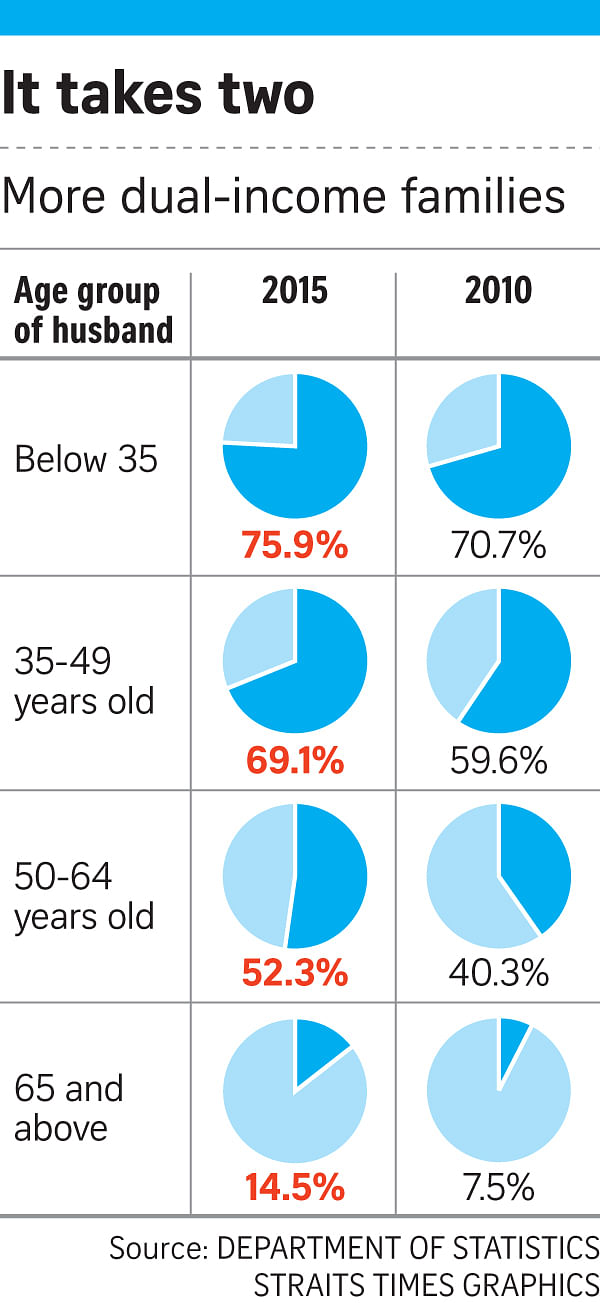CAN WE DO WITHOUT MAIDS?
Childcare: Teach life skills, tap community for help
Sign up now: Get ST's newsletters delivered to your inbox

A family having fun at an indoor water playground.
PHOTO: LIANHE ZAOBAO FILE
Rachel Au-Yong, Royanne Ng
Follow topic:
About 70 per cent of married couples where the husband is aged 35 to 49 earn dual incomes. Here are ways such couples with children can manage without a live-in maid.
NURTURING LIFE SKILLS
In 2011, there was an uproar when a photo of a maid carrying an army recruit's pack went viral online.
It sparked debate about a softer generation of Singaporeans, who are waited on hand and foot. Posters argued this made the young less resilient and independent.
One way around this is to lay down ground rules early. Human resource manager Shauna Lin, 39, says her daughters, aged six and nine, have to make their own beds and wipe their worktables. She and her husband, a 42-year-old lawyer, engage a part-time cleaner twice a week.

"We don't want our girls to grow up spoilt," she says. "The same rules apply when we visit friends with maids. The older girl knows she has to at least offer to take the dirty dishes to the kitchen."
OLDER NANNIES
Companies providing babysitting services boast that their nannies are more experienced and culturally aligned than maids, because most are older women from Singapore or Malaysia.
"There are few cultural differences and no language barriers. Most of our nannies are grandparents themselves, so they know how to take care of children. A lot of maids are in their 20s, so they might not have enough experience," says Mr Alex Chua, who owns Super Nanny.
Nanny services do not come cheap, and most companies stress that their employees do not do housework.
Mr Chua says his clients - about 80 per cent of whom are Singaporean - pay about $2,300 a month for both daycare and 24-hour care services. Mr Adrian Ng of BBNanny says monthly fees range from $800 to $1,650, depending on length of service required and the child's age.
In contrast, monthly wages for a maid start at $450 if she is a new hire from Myanmar.
Mr Chua hopes that the Ministry of Manpower can relax the rules covering Malaysian nannies, who make up about 80 per cent of his staff. Eligible Malaysians work as confinement nannies only until the child is 16 weeks old.
"Some mothers need help looking after children who are six months to a year old," says Mr Chua. "The parents might have health problems, or just need an extra hand, but our hands are tied."
TURNING TO NEIGHBOURS
One of the buzzwords that MPs, grassroots leaders and academics have been throwing about in recent years is "gotong royong", or community spirit. When it comes to childcare, why not turn to neighbours - retirees with zest or stay-at-home mothers looking for extra income?
National University of Singapore sociologist Paulin Straughan says that while the Government could do more to plug the gaps in childcare services, it is time to "bring back the kampung spirit and have people provide mutual support".
Retirees could tap their $500 SkillsFuture allowance to keep up to date on childcare, she notes.
Management assistant officer Clara Hong, 45, looked among her neighbours to find a nanny for her children 18 years ago. She made fliers and dropped them into mailboxes. A woman who lived a block away became her daughter's nanny, and she found a nanny for her son just next door.
Rachel Au-Yong and Royanne Ng

